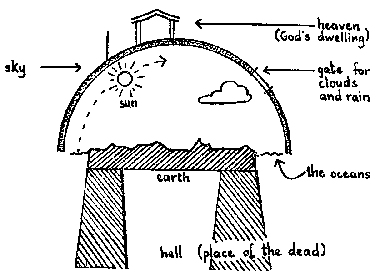
|
|
Examine tradition before trusting it
|
|
Exercise J
J1 Was Galileo’s conflict with tradition a rare case? Can you mension other examples where modern science contradicts the views of ancient traditions?J2 Do you agree with Galileo’s assessment that sacred scriptures do no teach science but religion? In that light, how do you explain the following ancient texts:From the Hindu Vedas:
From the Qur’an:
A3. [personal exercise] |
narration4. 1 Conflict with traditionGalileo Galilei, who born in Pisa, Italy, in the year 1564, became one of Europe’s leading scientists after studying and teaching in Pisa, Padua and Florence.He was the first scholar to use the newly discovered telescope for the study of the planets. His research confirmed his view that the earth revolves round the Sun, and not the Sun round the earth. However, this theory contradicted the commonly accepted traditional view of the universe. Tradition firmly asserted that the Sun rises at dawn and sets at dusk, going round the earth. This is how people saw the world at the time: 
Before the 15th century AD people all over the world generally believed that the earth was flat and that the sky was like a huge ceiling, a dome which covered the space above the earth as a roof. This is actually the way the universe looks to us when we look around us without the knowledge of science. It was popularly believed that the sun, moon and stars were balls of fire that moved along the sky from one side of the earth to another. The sun was supposed to rise in the East and travel along the sky during the day then set in the West and travel along the horizon during the night so that it could rise again the next day. The earth was presumed to be held firm as it rested on pillars. Underneath the earth one thought of a great abyss, a deep ocean in which there was place for lower gods or for the dead (hell). This traditional view seemed confirmed by passages in the Bible:
Galileo considered tradition & the scriptural texts. He came to the conclusion that he should trust the evidence of his scientific observation rather than unfounded tradition. Sacred writings are concerned with God and salvation, he said. They do not teach us science.
|
|
Exercise K
K1 As in other spheres of life, so also in religion, traditions can be a real treasure. However, if not properly handled, even religious tradition can constitute a stumbling block in our search for truth. Overestimating tradition leads to a darkening of our powers of thinking. Traditions need not be true, because they are old. Traditions need not provide the best solutions for our own times, even if they provided solutions that proved excellent in the past. What is your view on all this?
K2 What is your comment on the following quotes regarding ‘traditionalism’ [blind adherence to tradition]?
K3 Religious authorities can be useful guides at times, but are they entitled to suppress our freedom of thought and expression? Do you agree with the following two quotations? Why, or why not?
K4. [personal exercise]
|
If you want to obtain a certificate for this leadership course, register yourself by sending an email to Jos Rickman at the address given below. Mention (i) your name, (ii) your country, (iii) your email and (iv) the name of this course. And (v) attach a short document containing your answers to exercises J1, J2, K1, K2 & K3 of this lesson. |
The religious authorities of his day, the Pope and the chief theologians, stuck to a literal understanding of the Bible and refused to accept the evidence that Galileo had collected through his scientific observations. As a result, his views were condemned and he was treated as an unbeliever.
On February 24, 1616 Galileo’s scientific views were condemned by a special commission of theologians at Rome, the centre of the Roman Catholic Church. He was forbidden to “hold, teach or defend his opinion in any way, either verbally or in writing.”
On February 24, 1633 Galileo was again summoned to an ecclesiastical court, He was found guilty of ‘heresy’. He was made to kneel down and abjure his opinion. Until his death, in 1642, he was kept under house arrest . ...
“The statement that the earth is not the centre of the world; that the earth is not immovable, but that it moves, and also with the movement of a full day, is absurd, false philosophically, and, theologically considered, erroneous in faith.”
Condemnation by the Holy Office, 13 Febr. 1663
Galileo’s conflict became the best known example of the clash between scientific research and religious authoprity.
If our discoveries by science contradict what the sacred scriptures or religious authority seem to say, what should be our attitude?
Should the work of human science, the research of scholars or the reflections of our own mind, be rejected outright because they seem to oppose or contradict religious beliefs? Is it not a conflict between fidelity to one’s own intellectual honesty and religious authority?
Galileo asserted that the problem should not be solved at the expense of free human thinking and research:
“It is not in the power of any creature, not even of the highest religious authority, to make statements true or false, otherwise than if of their own nature and in actual fact they are true or false . . .
It is surely harmful to the religious good of people if the authorities make it a heresy to believe what has been proved to be a fact.”
Galileo Galilei in The Authority of Scripture in Philosophical controversies
Writings of Galileo:
Galileo’s Discoveries:
 |
 |
 |
 |
 |
| 1. Self Respect | 2. Integrity | 3. Study | 4. Doubt | 5. Generosity |